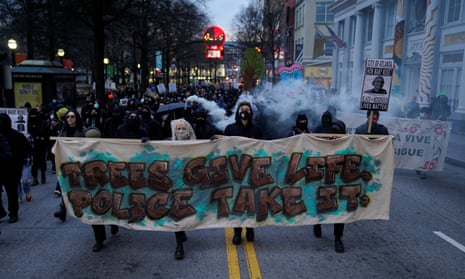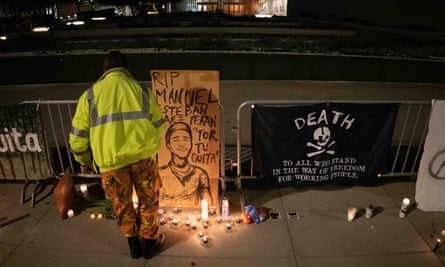Ron DeSantis Wants to Erase Black History. Why?

By Janai Nelson
“Ms. Nelson is the president and director-counsel of the Legal Defense Fund (LDF).
Sign up for the Opinion Today newsletter Get expert analysis of the news and a guide to the big ideas shaping the world every weekday morning.
An unrelenting assault on truth and freedom of expression in the form of laws that censor and suppress the viewpoints, histories and experiences of historically marginalized groups, especially Black and L.G.B.T.Q. communities, is underway throughout the country, most clearly in Florida. The state’s Department of Education recently rejected a pilot Advanced Placement African American studies course from being offered in Florida’s public high schools.
Under Gov. Ron DeSantis’s “Stop WOKE” law — which would limit students and teachers from learning and talking about issues related to race and gender — Florida is at the forefront of a nationwide campaign to silence Black voices and erase the full and accurate history and contemporary experiences of Black people. The NAACP Legal Defense and Educational Fund Inc., the American Civil Liberties Union, the A.C.L.U. of Florida and Ballard Spahr filed a lawsuit on behalf of university professors and a college student opposing the “Stop WOKE” law and, along with a second lawsuit, won a preliminary injunction blocking Florida’s Board of Governors from enforcing its unconstitutional and racially discriminatory provisions at public universities.
Florida’s rejection of the A.P. course and Mr. DeSantis’s demand to excise specific subject areas from the curriculum stand in stark opposition to the state-issued mandate that all students be taught “the history of African Americans, including the history of African peoples before the political conflicts that led to the development of slavery, the passage to America, the enslavement experience, abolition and the contributions of African Americans to society.”
While litigation continues, the various provisions of “Stop WOKE” and now the rejection of A.P. African American history could have devastating and far-reaching effects on the quality of education for Florida’s 2.8 million students in its public K-12 schools. The same reasons that the “Stop WOKE” law is blocked from enforcement in university settings hold for elementary and secondary schools. As a federal judge ruled in November, the law strikes “at the heart of ‘open-mindedness and critical inquiry,’” such that “the State of Florida has taken over the ‘marketplace of ideas’ to suppress disfavored viewpoints.”
Mr. DeSantis’s “Stop WOKE” law relegates the study of the experiences of Black people to a prohibited category. The canceling of any students’ access to accurate, truthful education that reflects their diverse identities and that of their country should chill every American. Not only do these laws offend First Amendment freedoms of speech and expression; to the extent they harm certain groups on the basis of race, gender or other protected status, they also violate principles of equal protection. And they are a chilling precursor to state-sponsored dehumanization of an entire race of people.
This disturbing pattern of silencing Black voices and aggressive attempts to erase Black history are one of the most visible examples of performative white supremacy since the presidency of Donald Trump. In 2019 the Florida legislature undermined Amendment 4, which a supermajority of Floridians supported and would have restored the voting rights of more than a million formerly incarcerated people. In its place, lawmakers put in place a pay-to-vote system that redisenfranchises hundreds of thousands of those citizens, many of them Black. Similarly, Florida’s antiprotest law, H.B. 1, was enacted in 2021 in response to the 2020 protests against police violence, when Black organizations and peaceful demonstrators in Florida — along with their allies — took to the streets with demands for justice.
What is happening in Florida is also happening in other states. Fifteen states now have active educational gag orders — and similar censorship measures are making their way through several state legislatures — with punishments including fines, civil suits, firing and criminal penalties for those who violate the broadly defined provisions. From July 2021 to June 2022, PEN America’s Index of School Book Bans listed 2,532 instances of individual books being banned, affecting 1,648 book titles. The content in most of the banned books involves prominent characters of color, L.G.B.T.Q. protagonists or themes and subject matter related to race and racism.
It’s no coincidence that these attacks are targeting not just historically marginalized people but also our very experiences of intersectionality. Mr. DeSantis recently rubbished the inclusion of “queer theory” in the A.P. African American studies course that was rejected, seeming to deny the need for future generations to learn about the contributions of queer Black American icons like Pauli Murray, Bayard Rustin, Audre Lorde and James Baldwin. Florida’s H.B. 1557, more widely known as the “Don’t Say Gay” law, also limits conversations about sexual orientation and gender identity in Florida classrooms and, like “Stop WOKE,” makes clear that the State of Florida seeks to suppress and target people’s identities.
Meanwhile, teachers, librarians and school officials providing guidance on diversity, equity and inclusion are said to have been pushed out of their jobs and gotten death threats. Last year ProPublica reported the chilling story of a Black educator who was chased out of Cherokee County in Georgia by a group of people incensed that she was bringing diversity, equity and inclusion initiatives to the school district.
Several book bans and other antitruth measures introduced in the past two years target The New York Times’s 1619 Project (and curriculum), which was created by Nikole Hannah-Jones — who won a Pulitzer Prize for her work — and is a linchpin in today’s conversations about the role of systemic racism in America’s history and its enduring impacts. In Wyoming and Texas, lawmakers and school officials have proposed measures mandating that objectively horrific historic events like the Holocaust and the trans-Atlantic slave trade be presented to American children neutrally and without judgment. (The Wyoming measure failed to pass the state’s legislature.) But why would we want our children to look at these atrocities without judgment?
Contrary to those advancing a false morality of ignorance and hollow patriotism as justification for barring students from discussing uncomfortable facts, we know that young people of all races benefit from an accurate and inclusive education. Students who are taught factual history don’t see themselves as victims or villains; in fact, research into the effects of ethnic studies K-12 curriculums found that discussing race and racism in school increases academic outcomes for students, reduces prejudice among white students and students of color and improves feelings of belonging in students of color and even their beliefs about their academic abilities. On the other hand, research shows that education that ignores students’ awareness of race, racism and stereotypes leads to increased prejudice.
The losses to our nation, if this broad attack on our shared history is allowed to continue, are incalculable. Not only will it breed a generation of Americans indoctrinated by ignorance; it will deny them the analytical skills to understand the complex history of this experimental democracy, as well as the historical grounding to sustain it. Students will arrive at institutions of higher learning wholly ill equipped to engage with the historical foundations of this country, which include and are inextricable from the history of Black Americans. Moreover, it will deny future generations the full story of turmoil and triumph that is America. It will also sow the racial divisions that enable white supremacy, which the F.B.I. has identified as a major domestic security threat, to thrive.
The good news is that most Americans oppose policies like book bans and support teaching the history of race in America — positions that indicate they value and understand the importance of truth. However, we must also respond to the urgency of this moment. While civil rights lawyers won’t rest in our fight against “Stop WOKE” and similar laws in courts and state legislatures across the country, we all have a role to play. It starts with recognizing what is happening: This is bigotry and erasure aimed at robbing America’s children of their educational birthright and all of us of a better shared future. Recognize what is happening, call it out and resist erasure.“




